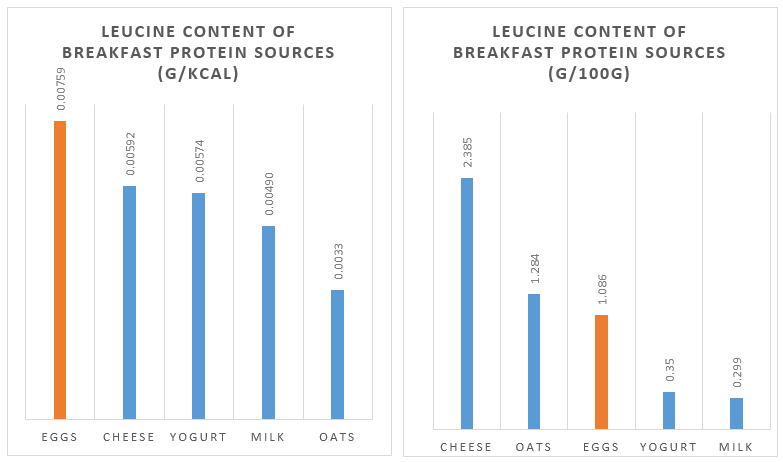
Protein is a critically important fuel source for muscles, and branched chain amino acids (BCAAs) are particularly so. Leucine is the most abundant BCAA found in muscles, and as the body of leucine research continues to grow, so does the evidence pointing to several benefits that leucine imparts, including the regulation of skeletal muscle protein synthesis. This was demonstrated in a study where leucine supplementation in a low dose of whey protein stimulated postprandial human myofibrillar protein synthesis as effectively as a much greater dose of whey protein (1). Similarly, a low-protein mixed macronutrient beverage supplemented with a high amount of leucine was found to be as effective as a high-protein beverage at stimulating muscle anabolism (2). Furthermore, results of another study on muscle recovery suggest that increasing the concentration of leucine in an essential amino acid supplement during moderate intensity exercise may increase post-exercise skeletal muscle metabolism (3). In addition to tissue protein synthesis, leucine in combination with vitamin B6 also increased fat oxidation and insulin sensitivity and reduced oxidative and inflammatory stress, thus suggesting a potential approach in the management of obesity (4).

Leucine is an essential amino acid, and as such, it must be obtained from dietary sources, since our bodies cannot produce it. Animal proteins in general are among the best sources of dietary leucine. Eggs contain 1.086g of leucine per 100g weight, which translates to approximately 9% of its total protein content (5). When compared to other foods commonly consumed for breakfast, eggs are not as high on a gram for gram basis as oats or cheese (see figure below). However, when a comparison of leucine content is made on a per calorie basis, eggs come out looking better than most other common food sources. At only 72 calories, with 6.3 grams of protein and a high leucine content, eggs are a nutritionally- and protein-dense food source, perfect for those trying to get a little more protein, leucine and other essential micronutrients in their diets.

As noted in the dialogue from the recent fourth meeting of the Dietary Guidelines Advisory Committee, protein is notoriously under-consumed at breakfast. Given their robust nutrient profile and leucine content, eggs can be an easy fix to this nutritional shortcoming and an important protein source to consider when helping patients and clients build healthful diets.
References:
- Churchward-Venne TA, Burd NA, Mitchell CJ, West DW, Philp A, Marcotte GR, Baker SK, Baar K, Phillips SM. Supplementation of a suboptimal protein dose with leucine or essential amino acids: effects on myofibrillar protein synthesis at rest and following resistance exercise in men. J Physiol. 20012; 590(Pt 11):2751-65.
- Churchward TA, Breen L, Di Donato DM, Hector AJ, Mitchell CJ, Moore DR, Stellingwerff T, Breuille D, Offord EA, Baker SK, Phillips SM. Leucine supplementation of a low-protein mixed macronutrient beverage enhances myofibrillar protein synthesis in young men: a double-blind, randomized trial.Am J Clin Nutr. 2014; 99(2):276-86.
- Pasiakos SM, MClung HL, McClung JP, Margolis LM, Andersen NE, Cloutier GJ, Pikosky MA, Rood JC, Fielding RA, Young AJ. Leucine-enriched essential amino acid supplementation during moderate steady state exercise enhances postexercise muscle protein synthesis. Am J Clin Nutr. 2011; 94(3):809-18.
- Zemel MB, Bruckbauer A. Effects of a leucine and pyridoxine-containing nutraceutical on fat oxidation, and oxidative and inflammatory stress in overweight and obese subjects. Nutrients. 2012; 4(6):529-41.
- USDA National Nutrient Database for Standard Reference. U.S. Department of Agriculture, Agricultural Research Service, USDA Nutrient Data Laboratory Website. Updated Dec 7, 2011.http://ndb.nal.usda.gov/. Accessed July 28, 2014.
